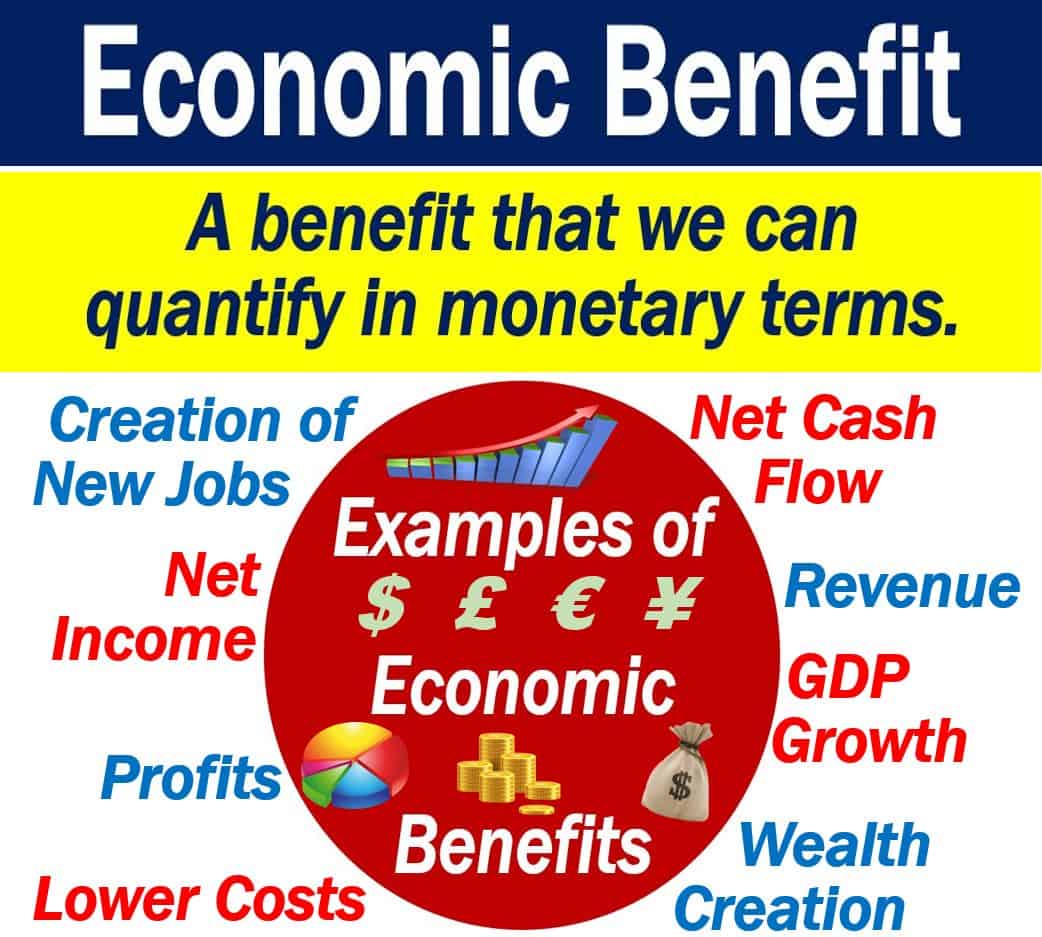An Economic Benefit is any benefit that we can quantify in terms of the money that it generates. Net income and revenues, for example, are forms of economic benefit. Profit and net cash flow are also economic benefits.
An economic benefit may also refer to a reduction in something such as a cost. For example, lower raw material or labor costs are economic benefits. In this context, ‘labor‘ refers to the ‘workforce.’
Investing in the workforce often yields indirect economic benefits, such as increased productivity and innovation, which can significantly boost a company’s competitive edge.”
When people talk about the economic benefit of something, they’re usually referring to how much money it could help save or make. In other words, it’s a way of showing that an idea, decision, or action has real financial value.
For example, if someone wants to convince a company to try a new product or strategy, they’ll often highlight the economic benefit, basically saying, “Here’s how this could help us earn more money or cut costs.” It’s an important part of making a strong business case to the people in charge.
If company directors are looking at a proposal, they carefully consider its economic benefits. If the proposer did not include the benefits in the proposal, the directors are much less likely to approve it.
Explaining what the economic benefits are helps them determine whether the proposal should go ahead.
However, if a proposal’s economic benefit is less than the potential harms, the decision-makers may turn it down.

Economic benefit or harm?
For example, let’s suppose that a lawnmower’s silencer represents 25% of its production cost.
Not fitting the silencer would save a lot of money, i.e., it would represent a significant economic benefit.
However, consumers are willing to pay more for less noise. Removing the silencer could, in fact, result in economic harm rather than benefit if sales plummeted.
Economic benefit decisions
Many different types of decision-makers consider economic benefits. A business person’s economic benefits are not the same as those for policymakers.
A business person uses measures such as ret cash flow, net income, or profits. Policymakers, on the other hand, will probably use producer and consumer surplus measures.
Economic benefit of infrastructure investment
Investing in a country’s infrastructure has considerable economic benefits, both in the short- and long-term.
Infrastructure refers to all the structures and systems which we take for granted such as roads, bridges, and tunnels. Power generation, airports, telephone lines, and railway lines are also infrastructure items.
In a 2011 report, by the Executive Office of the President, the authors explained that evidence of these benefits was evident in many infrastructure projects. The US President in 2011 was Barack Obama.
The authors mentioned that the upgrading of four major bridges reduced congestion costs by $100 billion.
Regarding investing in infrastructure, the authors wrote:
“The U.S. economy relies heavily on transportation infrastructure, and these investments to improve the condition and performance of our infrastructure allow people and goods to move more efficiently and safely around the country.”
Beyond immediate financial gains, the economic benefits of such infrastructure improvements often extend to enhanced social welfare and increased economic opportunities for local communities.
“Economic benefit” in various contexts
Here are seven sentences illustrating how the term “economic benefit” is applied in different scenarios, from environmental efforts to personal financial decisions:
- “The economic benefit of switching to renewable energy sources transcends mere cost savings, contributing to a more sustainable planet.”
- “Homeowners often find the economic benefit of remodeling includes increased property value and improved marketability.”
- “The new stadium’s construction brought significant economic benefit to the city through job creation and increased tourism.”
- “Companies may receive an economic benefit from employee wellness programs via reduced healthcare costs and decreased absenteeism.”
- “By implementing efficient water usage policies, the agricultural sector can reap the economic benefit of conservation while safeguarding the environment.”
- “The government’s tax relief program for small businesses is designed to provide an immediate economic benefit and stimulate growth.”
- “Investing in education has a profound economic benefit by equipping the workforce with skills needed for the jobs of tomorrow.”
